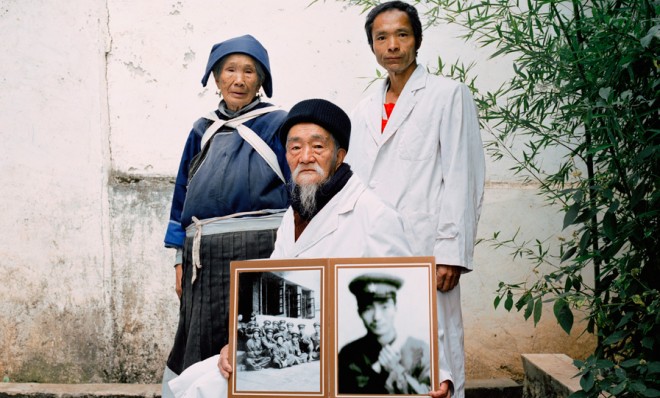How the elderly are treated around the world
In countries like Korea and China, you can expect to be taken care of by your family. In America and England, not so much

A free daily email with the biggest news stories of the day – and the best features from TheWeek.com
You are now subscribed
Your newsletter sign-up was successful
A new "Elderly Rights Law" passed in China wags a finger at adult children, warning them to "never neglect or snub elderly people" and mandating that they visit their elderly parents often, regardless of how far away they live. The law includes enforcement mechanisms, too: Offspring who fail to make such trips to mom and dad face potential punishment ranging from fines to jail time.
If the Elderly Rights Law is any indication, Chinese parent-child relationships have become a bit complicated lately. Eastern cultures like China's adhere to the Confucian tradition of "filial piety," which prioritizes the family unit and values elders with the utmost respect. But China's rapid industrialization has forced people to flock to urban areas for work, causing many adult children to move farther away from their parents, who often remain in rural areas and are unfit to pick up and move.
How cultures view and treat their elderly is closely linked to their most prized values and traits. Here, a sampling of the experience of aging in different cultures around the world:
The Week
Escape your echo chamber. Get the facts behind the news, plus analysis from multiple perspectives.

Sign up for The Week's Free Newsletters
From our morning news briefing to a weekly Good News Newsletter, get the best of The Week delivered directly to your inbox.
From our morning news briefing to a weekly Good News Newsletter, get the best of The Week delivered directly to your inbox.
Korea: Celebrating old age
Not only do Koreans respect the elderly, but they also celebrate them. For Koreans, the 60th and 70th birthdays are prominent life events, which are commemorated with large-scale family parties and feasts. As in Chinese culture, the universal expectation in Korea is that roles reverse once parents age, and that it is an adult child's duty — and an honorable one at that — to care for his or her parents.
Japan: An elderly predicament
Like the Chinese and the Koreans, the Japanese prize filial piety and expect children to dutifully tend to their parents. But Japan also faces the unique problem of tending to an increasingly elderly population. According to Social Gerontology: A Multidisciplinary Perspective, 7.2 percent of the Japanese population will be 80 or older in 2020 (compared to 4.1 percent in the U.S.), which will likely lead to a host of new problems for the country. Adult diapers are already outselling baby diapers, and the pension system is on course to dry up.
A free daily email with the biggest news stories of the day – and the best features from TheWeek.com
The U.S. and U.K.: Protestantism at play
Western cultures tend to be youth-centric, emphasizing attributes like individualism and independence. This relates back to the Protestant work ethic, which ties an individual's value to his or her ability to work — something that diminishes in old age. Anthropologist Jared Diamond, who has studied the treatment of the elderly across cultures, has said the geriatric in countries like the U.K. and U.S. live "lonely lives separated from their children and lifelong friends." As their health deteriorates, the elderly in these cultures often move to retirement communities, assisted living facilities, and nursing homes.
France: Parents also protected by law
It's difficult to imagine such an Elderly Rights Law being a legislative priority in many Western cultures. France did, however, pass a similar decree in 2004 (Article 207 of the Civil Code) requiring its citizens to keep in touch with their geriatric parents. It was only enacted following two disturbing events, though: One was the publication of statistics revealing France had the highest rate of pensioner suicides in Europe, and the other was the aftermath of a heat wave that killed 15,000 people — most of them elderly, and many of whom had been dead for weeks before they were found.
The Mediterranean and Latin culture: One big, happy family
Mediterranean and Latin cultures place similar priority on the family. In both cultures, it's commonplace for multiple generations to live under one roof, (à la My Big Fat Greek Wedding) sharing a home and all the duties that come with maintaining one. In the contemporary iteration of this living arrangement, the oldest generation often is relied on to assist with caring for the youngest, while the breadwinners labor outside the home. As such, the aged remain thoroughly integrated well into their last days.
Karina Martinez-Carter is an assistant editor at Map Happy and a freelance journalist based in Buenos Aires, Argentina. Her work has appeared with BBC Capital, BBC Travel, Thrillist and Quartz, among other publications.
-
 Hotel Sacher Wien: Vienna’s grandest hotel is fit for royalty
Hotel Sacher Wien: Vienna’s grandest hotel is fit for royaltyThe Week Recommends The five-star birthplace of the famous Sachertorte chocolate cake is celebrating its 150th anniversary
-
 Where to begin with Portuguese wines
Where to begin with Portuguese winesThe Week Recommends Indulge in some delicious blends to celebrate the end of Dry January
-
 Climate change has reduced US salaries
Climate change has reduced US salariesUnder the radar Elevated temperatures are capable of affecting the entire economy